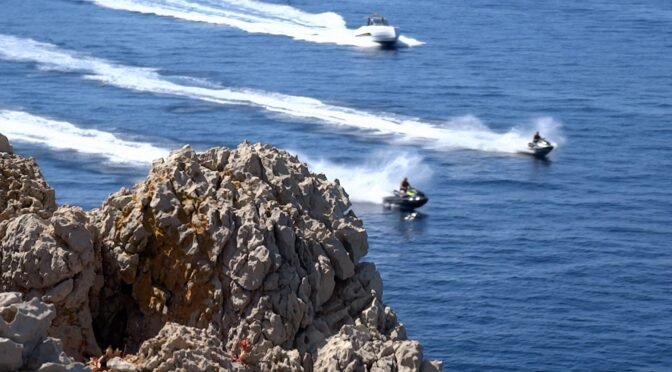Views: 1192
The organisations SOS Costa Brava, Ecologistas en Acción, SOS Mar Menor and GOB recently met in Madrid with the Director General of the Merchant Navy, Gustavo Santana, to express our shared concern about the growing impacts of nautical overcrowding along the entire Spanish coastline.
During the meeting, it was made clear that the main cause of this situation is the excessive number of recreational boats operating without control or oversight. In recent years, in the most saturated areas, this reality has led to an increase in unsafe conditions along the coastal strip, with concerning episodes such as collisions between boats, accidents involving swimmers, risks during sports activities, and severe impacts on marine ecosystems.
For several months, the organisations involved have been promoting a campaign to demand urgent measures to halt this trend and reduce risks in coastal waters. We have already released two videos to raise awareness about the effects of nautical pressure on the coast, people and biodiversity, and to share our proposals with society. These same proposals have been submitted to the competent bodies in charge of legislation and regulatory amendments, such as the General Directorate for the Coast and the Sea and the Merchant Navy itself. It is with the latter that we were able to meet, recognising their key role in maritime safety.
We welcome the willingness of the General Directorate of the Merchant Navy to listen to our demands and to assess, within the scope of their powers, their feasibility. Despite the evident difficulties arising from the complex distribution of powers among different administrations, we believe it is essential to move towards a clearer, more coherent, and more effective regulation of recreational nautical activity.
In this regard, we shared five concrete proposals aimed at improving safety and reducing environmental impact:
- Reduction of coastal speed, setting a speed limit of 5 knots within the first 300 metres from the shore to protect people and habitats.
- Regulation of anchoring, prohibiting it within the first 50 metres of beaches and 20 metres from the rest of the coastline to preserve sensitive areas and ensure safe bathing zones.
- Mandatory use of protected species cartography through nautical charts and nautical licence training to safeguard marine habitats.
- Prohibition of navigation without a licence, especially concerning the rental of boats by people with no knowledge of navigation, maritime safety or good practices at sea.
- Improvement of monitoring and enforcement mechanisms to ensure compliance with existing regulations and prevent impunity for violations.
Additionally, we stressed the need to update state regulations that no longer reflect current realities, such as the Coastal Law or the Maritime Navigation Regulation, and pointed out the importance of having clear and accessible data on the number of vessels and their territorial distribution.
All the organisations advocate for safe and sustainable navigation as a key element for coastal communities and the conservation of marine biodiversity. We therefore call on Mr Santana to take our demands into account and to act accordingly by promoting stricter and more effective regulations to ensure safer and more respectful navigation for both people and biodiversity.

